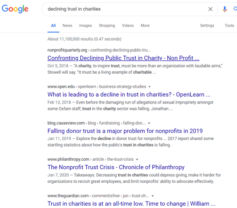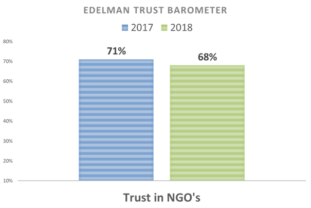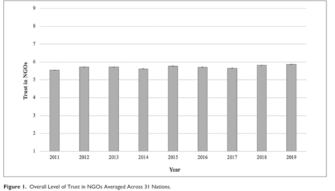Myth Busting: Trust in Charities is NOT Declining
We’ve busted many a myth, including:
- MYTH: Ask more = make more. BUSTED: Never the full story and often wrong. Most often the practice shifts dollars forward and creates significant irritation (through volume) that directly decreases retention and donor value. The myth represents a grossly oversimplified ‘formula’ that violates the maxim, make things as simple as possible but not simpler. [See a sampling of Agitator posts on this here, here and here.]
- MYTH: Ask more = make more with email. BUSTED: Nope. Email isn’t magical and sure isn’t free when it comes to retaining donors, raising money and avoiding the law of diminishing returns. [See a sampling of Agitator posts on this here, here and here.]
- MYTH: Generational marketing or thinking is useful. BUSTED: “Sure”. If you assume 72 million people is a useful marketing segment. We don’t. In practice generational marketing is pretty much a bust when it comes to fundraising. [See a sampling of Agitator posts on this here, here and here.
- MYTH: Donors are all the same BUSTED:. No, they’re not. Very few fundraisers verbalize this, but the one-size-fits-all approach of the sector shows the myth is very much alive.
- MYTH: The Earth is flat BUSTED: No. it isn’t. The Agitator hasn’t weighed in on the subject.
And… Now This:
- MYTH: Trust in charities is declining. BUSTED: Wrong. Everybody says it’s so and that must make it true. Hell, Google confirms it.)

HOWEVER...a new study by a colleague and friend, Cassandra Chapman (No Global Crisis of Trust: A Longitudinal and Multinational Examination of Public Trust in Nonprofits), a PhD researcher and lecturer at the University of Queensland does what DonorVoice does, digs deeper to get beyond the superficial by adopting a healthy, contrarian mindset so desperately needed with pre-pandemic, downward trend lines in retention and conversion and upward trend lines in cost – i.e. a recipe for slow decline.
The ironic part is she debunked the declining trust myth using the same data set that led to this headline,
“The Edelman Trust Barometer, an annual study looking into how public trust has changed across the world, found that confidence in the government, nonprofits, the media, and business has collapsed.”
“The root cause of this fall is the lack of objective facts and rational discourse,” said Richard Edelman, president, in the report.
As Mark Twain said, ‘lies, damn lies and statistics”. But this isn’t about intentional lying or manipulation of the data, it’s about ignorance being bliss with overly simplistic analysis (which is plaguing our sector) and then finding “evidence” to fit our mind’s eye and reinforce the story we’re seeing in the data.

All it takes is a single bar chart showing trust going down and our brains move into hyper-speed to support this emerging story. Scandals, abuse of charity staff, slow disbursement of emergency funds, outright fraud…all of it easily fits and explains our simple bar chart.
Richard Edelman is a smart guy but he isn’t a data scientist, nor is his team of generalists putting this “research” together.
Descriptive data should always leave us questioning, not accepting.
Let’s dig in. Edelman’s reports are in aggregated form and collapse a lot of the data for simplicity’s sake. Trust is measured with a (grossly oversimplified) single question:
Please indicate how much you trust NGO’s to do what is right using a nine-point scale where one means that you “do not trust them at all” and nine means that you “trust them a great deal.”
People who respond 6 to 9 are collapsed into a single “Trustor” category and this is singularly used to indicate trust levels. What? Why have a nine-point scale if you are going to reduce it down to a binary scale of “6 to 9” or less than 6? This can greatly exaggerate small changes along this 9 point scale.
Cassandra and team got Edelman to provide them with anonymized, raw data (i.e. all the 1-9 answers) for 29 countries from 2011 to 2019. This represents 294,176 responses to the single trust question.
In their initial look at the descriptive data there doesn’t appear to be any real pattern, just slight fluctuations up and down. But, this was only the start of the analysis.

They ran a series of models to examine the relationship between time and trust. If trust is declining the model should indicate a relationship – i.e. as time increases, trust goes down.
They found that time explained almost none of the small, observed changes in the trust score. In fact, in only two of the 29 countries (India and Indonesia) was the relationship significant and even in those cases, it explained only 1% of the changes in the trust score.
They went on to add in sociodemographic factors and found a myth busting sub-fact, trust in charities is rising among those under 40. What? How is that possible? I read in no less than the Washington Post a headline saying “Millennials Don’t Trust Anyone. That’s a big deal”. If it were true then maybe it would indeed be a big deal.
Cue the “generational marketing is garbage” soundtrack. It’s an oldie but a goodie.
Dig deeper. Don’t rely on descriptive data for anything other than prompting more questions on the way to a better, more complete analytical plan. And stop (if you started) collapsing data randomly.
Finally, don’t rely on simple, one-item measures for complex constructs like Trust.
This is a noted limitation of Cassandra’s research but she could only play the hand (i.e. dataset) she was dealt but would prefer a more robust, theory-based set of items, similar to the DonorVoice Commitment Score, which measures Trust among other latent constructs for a relationship score that is much more predictive than donor satisfaction or Net Promoter or for that matter, any commercial, competitive metric we’ve seen.
Kevin



Wow! This article makes a sweeping claim that the notion of declining trust in the nonprofit sector is simply a myth. However, shooting holes in ONE STUDY does not entitle you to claim that trust in charities is NOT on the decline. There have been other studies in recent years that have found declining trust. The Guardian, Gallup, Princeton Analytics, Give.org, to name just some, have all issued reports that have shown declining trust in the charity sector. Before you can claim that trust in the sector is just fine, you have a bunch of other studies you need to shoot holes through. Like you wrote, “Finally, don’t rely on simple, one-item measures for complex constructs like Trust.”
Michael, we were acknowledging and agreeing the dominant storyline is that trust is declining. You can find plenty of studies, including the ones you rattled off that support your view. However, what they share in common with the Edelman Trust barometer is oversimplification; aggregate level data, often collapsed and no multivariate analysis – just descriptives.
You of course are free to believe whatever you like and support it with whatever studies you choose and ignore this original, highly analytical and much more rigorous, global piece of work that made use of the very type of data you’d use to support your view while showcasing how simple analysis is often misleading. The better question in our view, at least for digging deeper and expanding our horizons is to wonder how this piece of work can be true in face of all the other evidence you cite. You may still decide to believe what you believed before encountering this study. But, I’d strongly encourage you to read it, in full before reaching that conclusion.
I have. And I’ve read most of the others you list. It isn’t the first nor will it be the last time that DonorVoice and the Agitator are contrarian but not for the sake of it, when data warrants it.
Wouldn’t the greatest indicator of trust be how many people are still giving money to nonprofits? I wouldn’t say that, in general, I “highly trust” NGO to do what is right. Having worked at a highly esteemed nonprofit that was later investigated for charity fraud, I know how easy it is for executives to hide wrongdoing. I would probably say that I trust them at a 6.
However, do I trust nonprofits enough to keep working in the industry? Yes. Do I trust them enough to keep donate a significant portion of my salary? Yes. Do I understand that some nonprofits are very honest and others are crooked and that a bunch are somewhere in between? Yes!
And as a millennial, I will keep giving, knowing that some people will take advantage of me and others will do truly wonderful things with my gifts. Worth it.